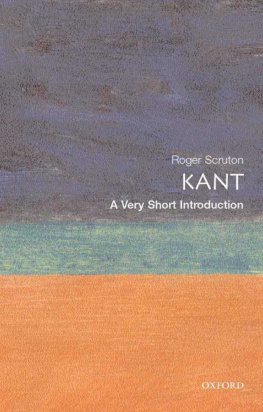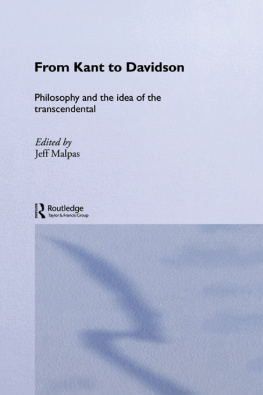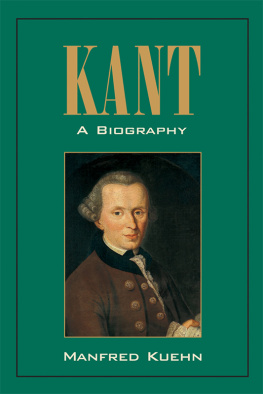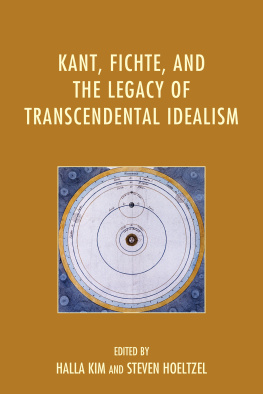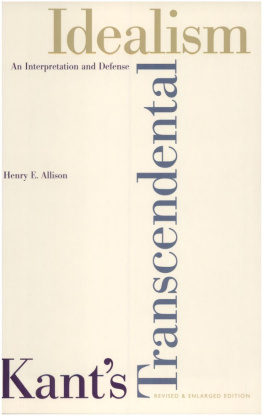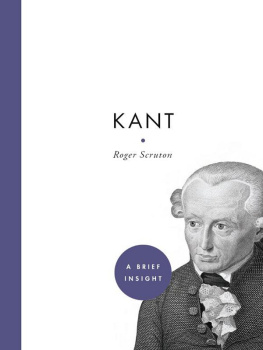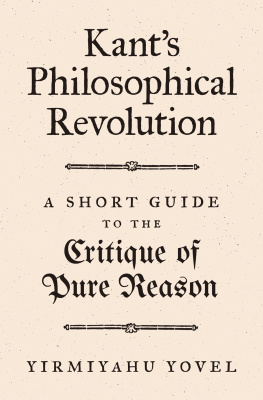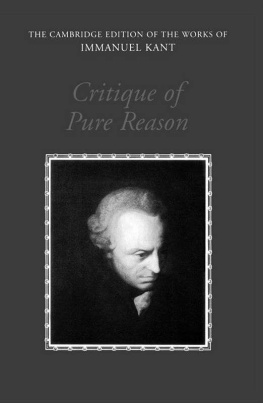CONTENTS
Guide
Pages
Before Tomorrow
Epigenesis and Rationality
Catherine Malabou
Translated by Carolyn Shread
polity
First published in French as Avant demain. pigense et rationalit
Presses Universitaires de France, 2014
This English edition Polity Press, 2016
Polity Press
65 Bridge Street
Cambridge CB2 1UR, UK
Polity Press
350 Main Street
Malden, MA 02148, USA
All rights reserved. Except for the quotation of short passages for the purpose of criticism and review, no part of this publication may be reproduced, stored in a retrieval system, or transmitted, in any form or by any means, electronic, mechanical, photocopying, recording or otherwise, without the prior permission of the publisher.
ISBN-13: 978-0-7456-9153-4
A catalogue record for this book is available from the British Library.
The publisher has used its best endeavours to ensure that the URLs for external websites referred to in this book are correct and active at the time of going to press. However, the publisher has no responsibility for the websites and can make no guarantee that a site will remain live or that the content is or will remain appropriate.
Every effort has been made to trace all copyright holders, but if any have been inadvertently overlooked the publisher will be pleased to include any necessary credits in any subsequent reprint or edition.
For further information on Polity, visit our website: politybooks.com
TRANSLATORS FOREWORD
Epigenesis of Her Texts
Tomorrow, the order of precedence between program and its translation will be inverted.
Catherine Malabou
With every new Malabou translation comes a fresh understanding of my practice and another translation manifesto. Working with her especially this time, where for over a year the author has been the translators partner in transforming her text translation has assumed its plasticity, its change, its accident, and, now, its epigenetic function. As Malabou analyzes the epigenesis of Kants notion of rationality in Before Tomorrow, I am led to consider how, in translation, her own texts undergo a process of epigenesis: that is, the biological process of cellular differentiation. Which parts are sloughed off and which undergo maturation? How does Malabou develop in her arrival in English? Does the move into the Anglophone context allow for a development of that which is premature or impeded in French? Where else is she going? Who will retranslate her work tomorrow?
In the sinews of her rigorous and unrelenting tracking of Kantian philosophy, Malabou proposes that critique itself, from the Critique of Pure Reason to the Critique of the Power of Judgment, is subject to epigenetic development (156). Drawing again on the sciences that other continental philosophers have turned their backs on, she finds the most exciting movements of our era and brings to life biology. She confronts the moment when Kant is to be relinquished by speculative realists by uncovering in his work the resources she needs to open the chink of a farewell (xiii). She will bring in the life force of new frontiers in biology, for the time has come to say it: transcendental epigenesis is epigenesis of the transcendental itself (158). That which we thought was set in stone will be rocked by a new focus, shattered, then regrounded, differently: The transcendental is subject to epigenesis not to foundation (158).
Beyond all the trying genetic investigations, always in search of a lost, inaccessible, founding origin, Malabous book on Kant acknowledges frankly that epigenesis can produce (50), even if it builds on moving grounds. For our part, as translation theorists, we have been thinking translation in genetic terms and therefore failing to account for, or recognize, epigenetic productivity. Yet translation is epigenesis. After the afterlife and after survival, the plastic life of the text. As translators, we now all have a new word for our art, something to help us explain how it is that texts are not complete until they are translated. How it is that texts bear the program to translate, the need to develop their parts in translation. That translation is generative, not as a succession or connection of events taking place in a linear fashion starting from a given, identifiable point (175), but rather, more holistically, as the temporality of a synthetic continuum within which all of the parts are presented together in a movement of growth whereby the whole is formed through self-differentiation (178). Translation is that process in which the text self-differentiates and thereby grows, develops, matures.
Malabou deploys new biological paradigms to read Kant, and in turn, reading her, I propose that we adopt epigenesis in translation studies to better describe the plasticity of the translating process. But is this any different from the multiplicity of metaphors that the discipline has already developed? The proposal and contestation of metaphors is integral to our field, from Lori Chamberlains foundational Gender and the Metaphorics of Translation (1988) to James St Andrs recent essay collection, Thinking through Translation with Metaphors (2014). Analogical thinking seemingly corresponds to our relational practices. But epigenesis is different. Just as Malabou is sensitive to the fact that her argument rides on being more than a rhetorical artifice, that her parsing of Kants phrase in paragraph 27 of the Critique of Pure Reason, as it were a system of epigenesis of pure reason, must be more, for if it turns out that epigenesis is only an image with nothing other than an exoteric, pedagogic, or illustrative role, then my entire elaboration is meaningless (181). Indeed. To say what is goes far beyond as it were, and at this point, translation studies, too, must go beyond analogy to talk mechanics, life systems.
The slow seismic shifting or the shock of the quake. The moment in a translation when words slip, leap, echo, fly. Epigenesis: is that what translation is? Is that how we rid ourselves of the genetic paradigm that has shackled us to the original? Is it here, again, translating Malabou, that I find an answer to my questions about how to frame translation? It is and I dont think its just a translators conceit. Even as the authors closest readers, we, translators, work at the surface, determined to achieve the moment where their difference disappears right into their contact (157). We translate and retranslate, conscious that epigenesis marks the current valency of the meeting point between the old and the new, the space where they reciprocally interfere with and transform one another (158). Epigenetics describes how specific genes are activated or deactivated in response to environmental variants the gene expression that is the transcription and translation of genetic code. The epigenesis of translation is about how texts turn off and on to speak to their audience, to react to their specific contact point. And so here, with a translation that is at once biological and textual, I find that epigenesis, then, is the meaning in translation.
Carolyn Shread
Notes
Peter Connor, conversation, Translation in Transition conference, Barnard College, May 2015. Lori Chamberlain, Gender and the Metaphorics of Translation,
Signs: Journal of Women in Culture and Society, vol. 13, 1988, pp. 45472; James St Andr, ed.,
Thinking through Translation with Metaphors, New York: Routledge, 2014.
Epigignomai: (1) to be born after (oi epigignomenoi, the descendants); (2) to arise, to take place; (3) to add.
All evolution is epigenetic.
Georges Canguilhem


